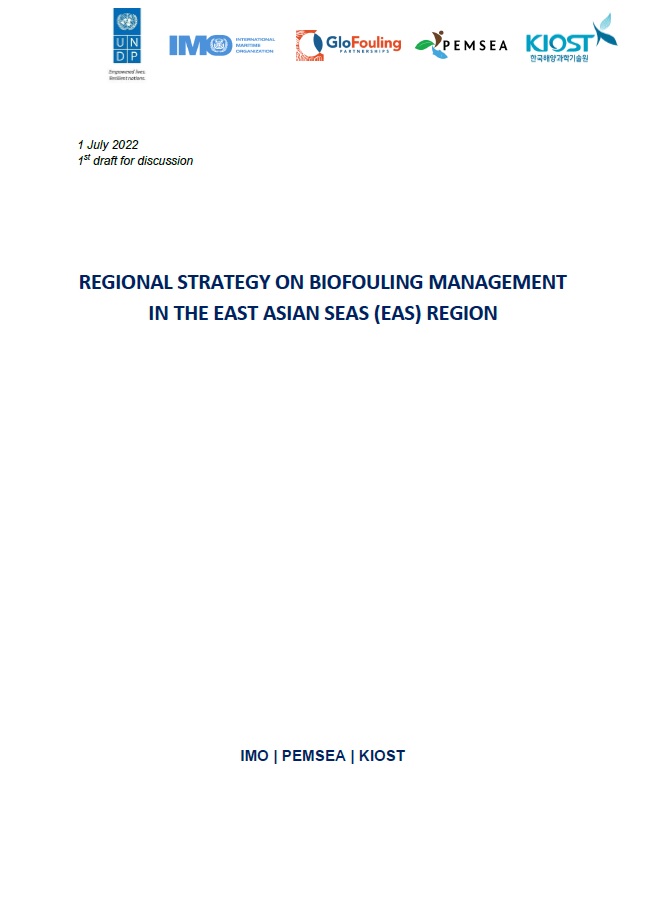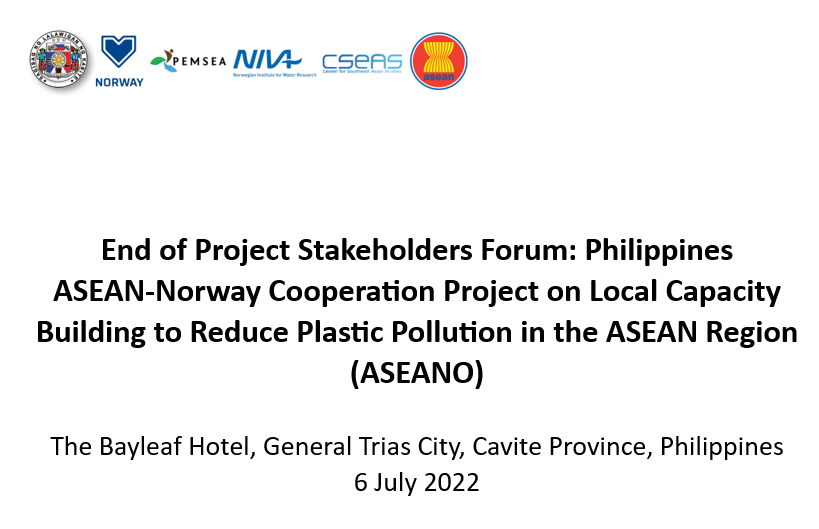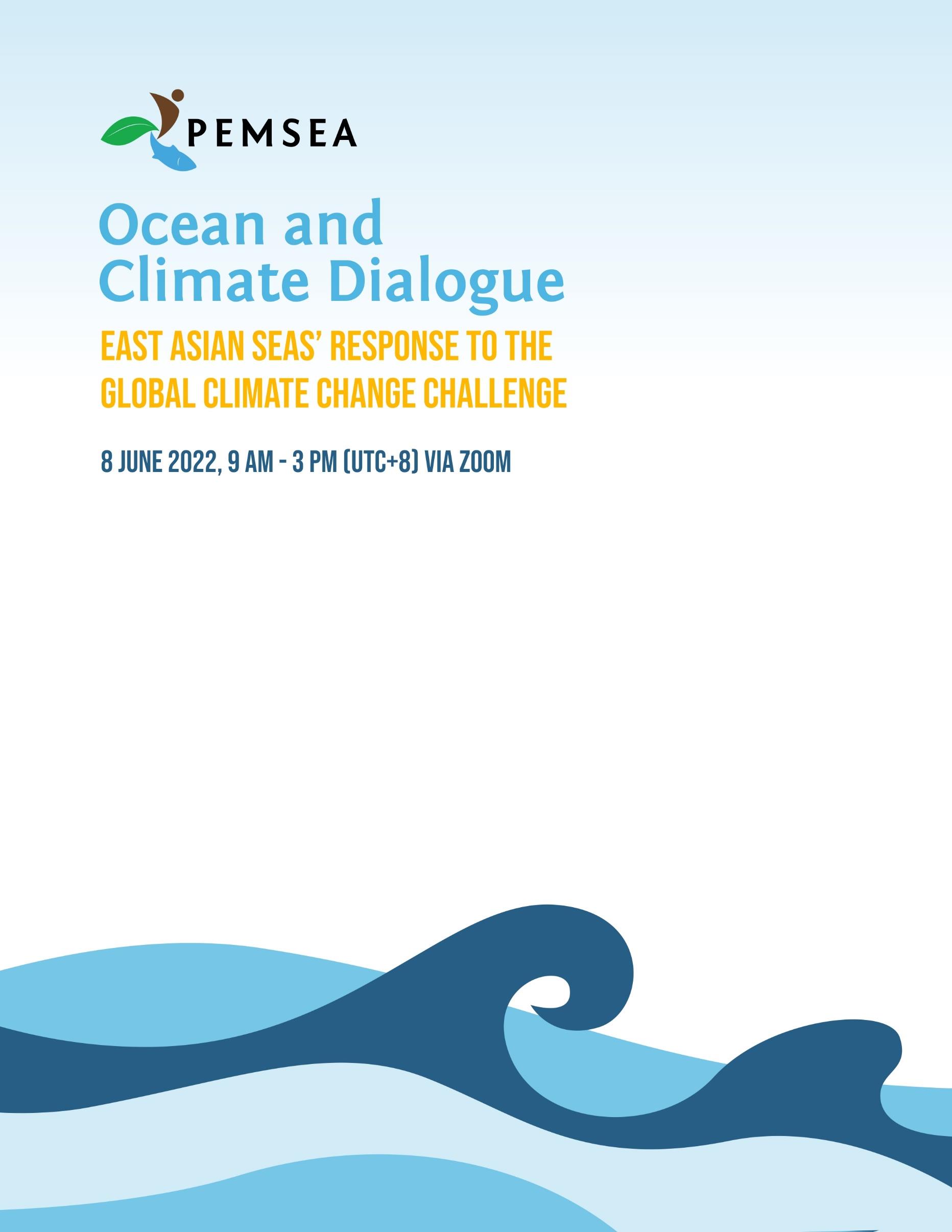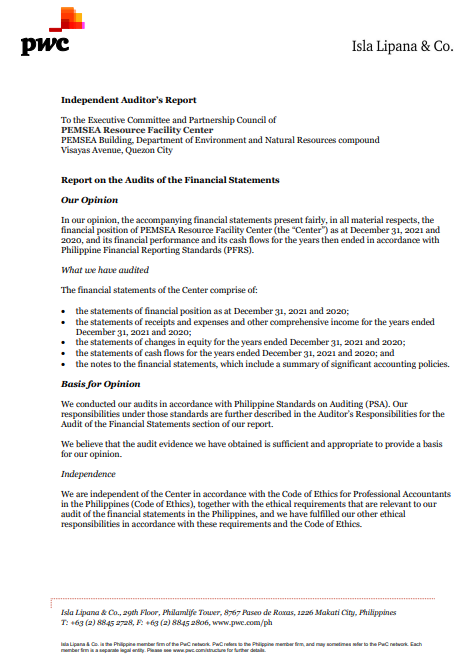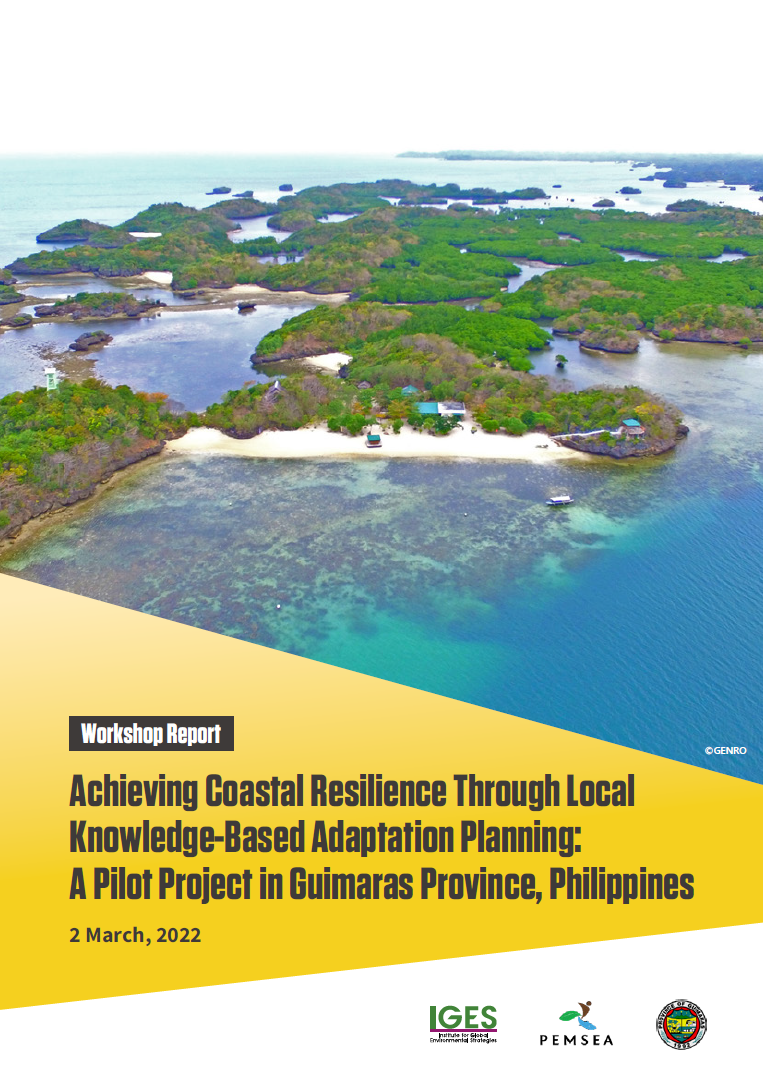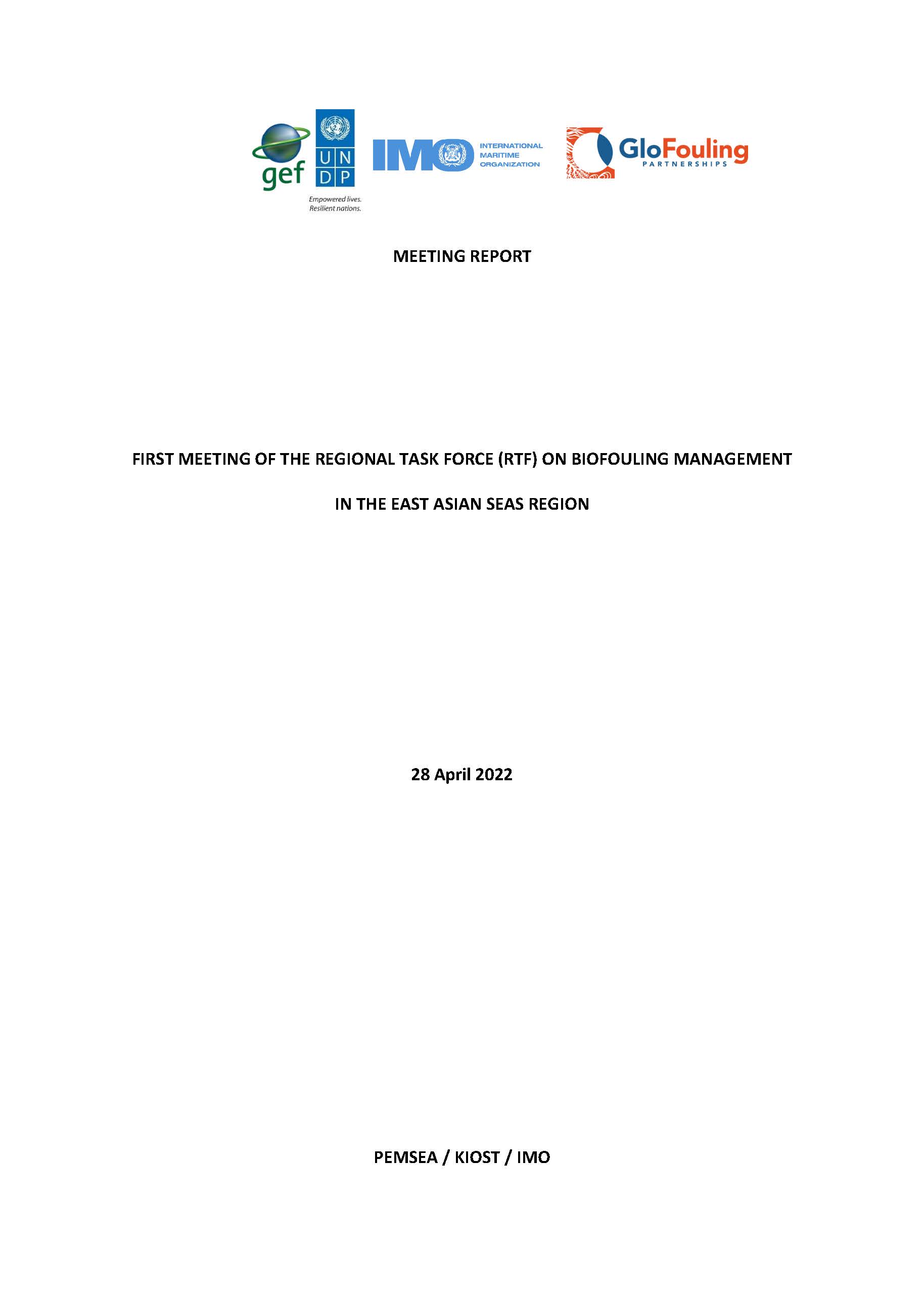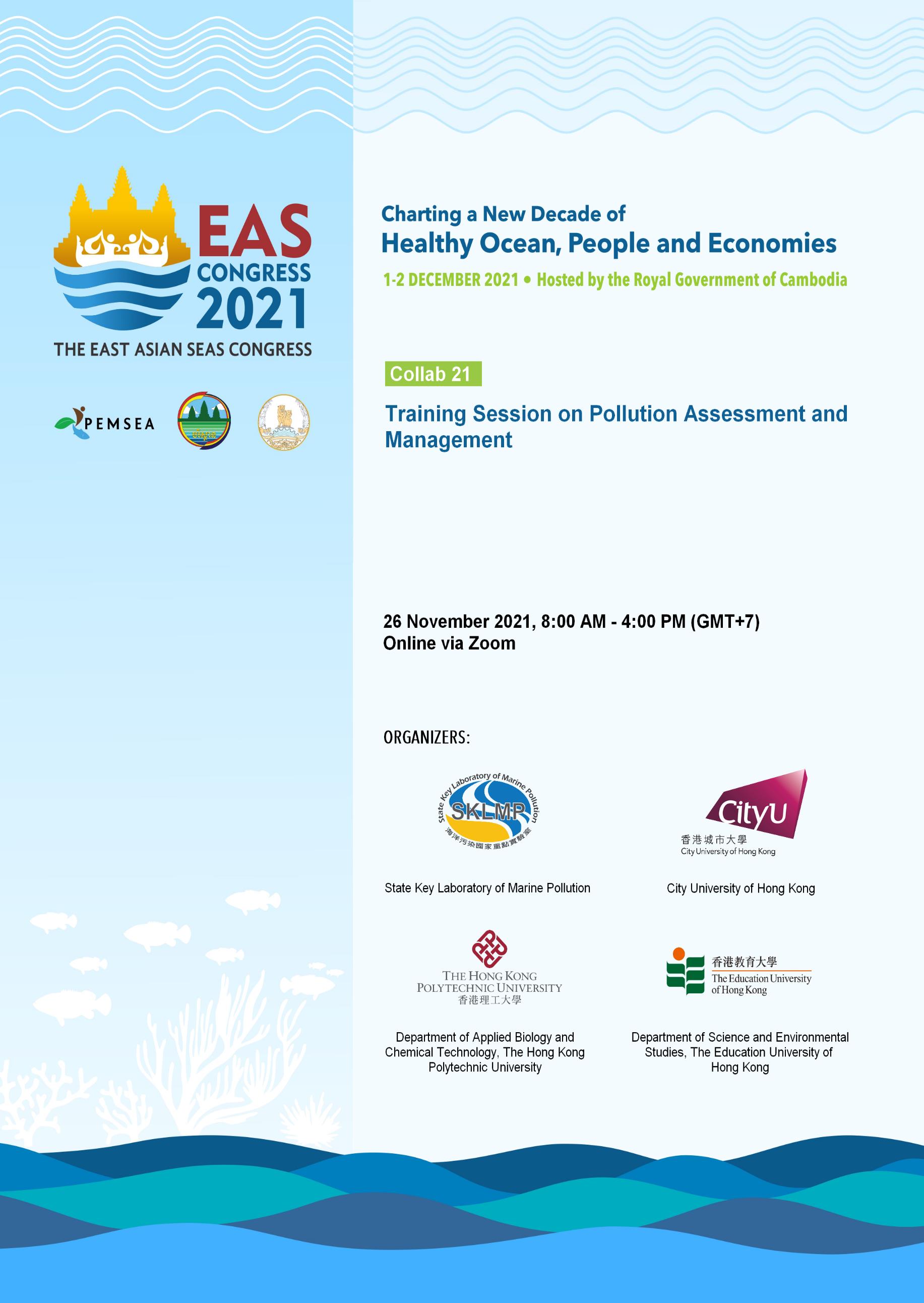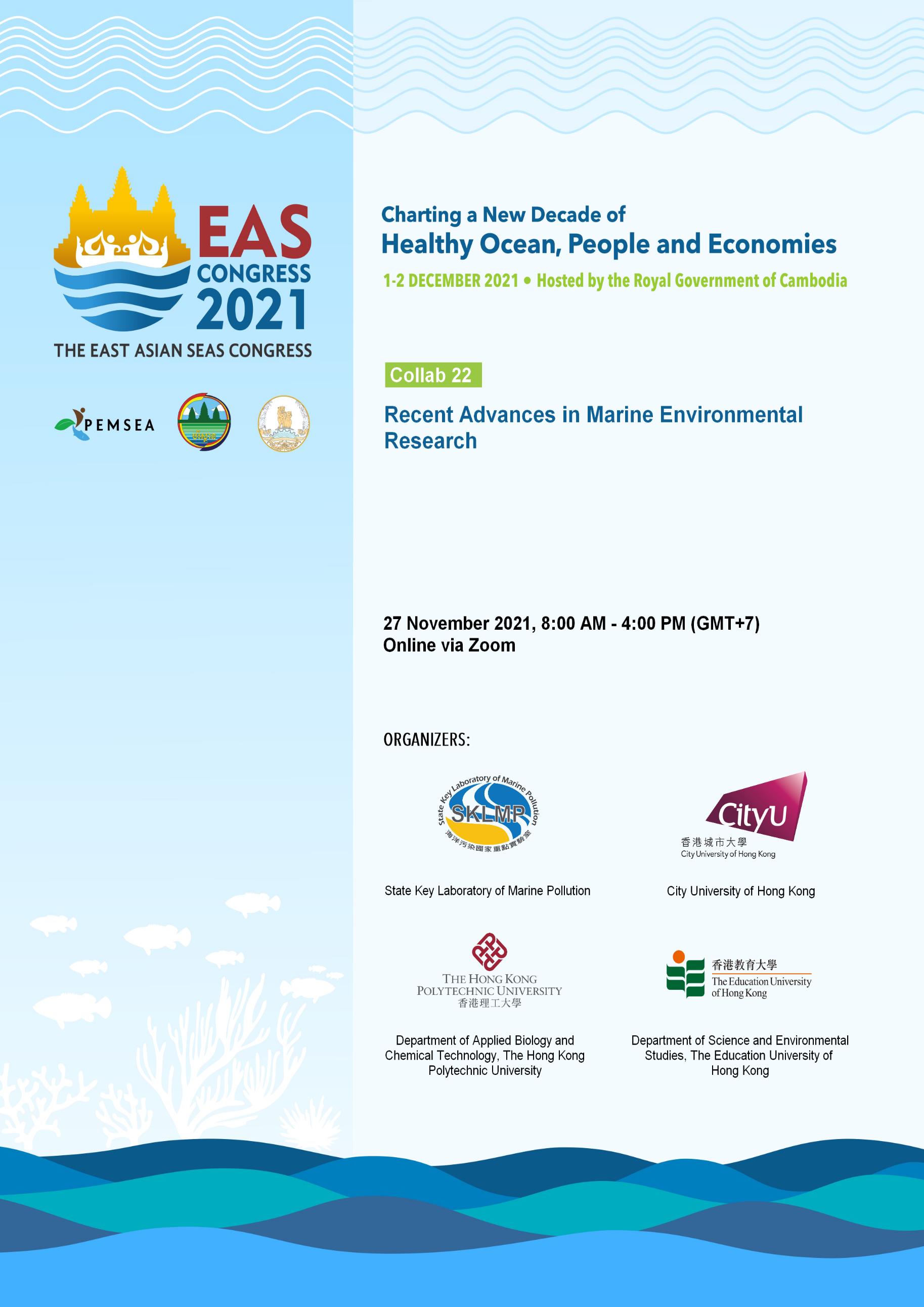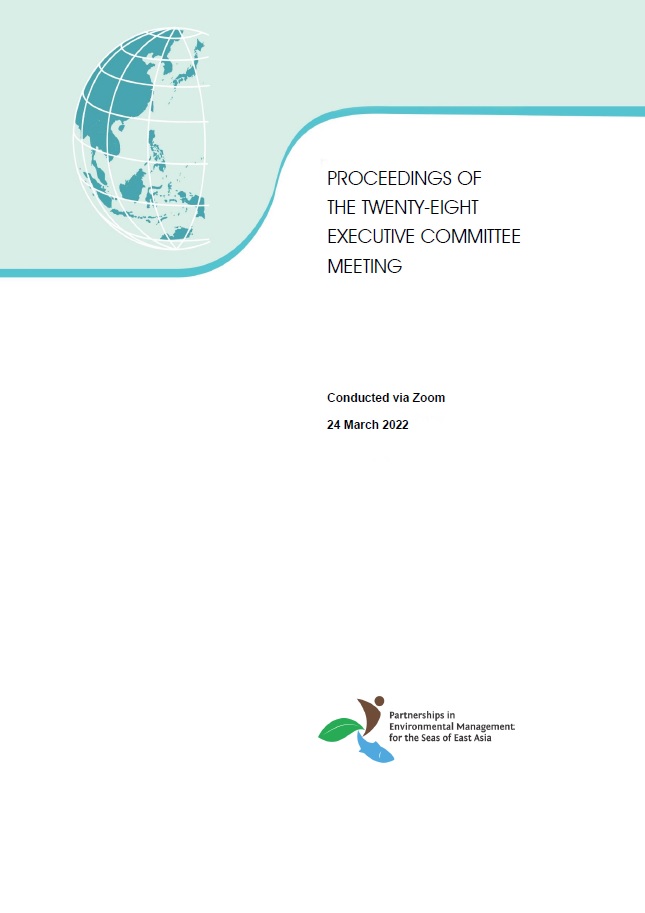
Breadcrumb
-
Regional Strategy on Biofouling Management in the East Asian Seas (EAS) Region
The UN World Ocean Assessment has confirmed the role of Invasive Aquatic Species (IAS) as a major driver for biodiversity change in the world’s freshwater, coastal and marine ecosystem[1]. Globally, about 2,000 marine species have been introduced to new locations through human-mediated movements. When they become invasive, most of them have had negative ecological, socioeconomic and human health impacts. With increased trade and climate change, biological invasions are likely to increase. The main vectors for unintentional transfer of invasive aquatic species are ships' ballast water, biofouling of mobile marine structures and aquaculture.
-
End of Project Stakeholders Forum: Philippines ASEAN-Norway Cooperation Project on Local Capacity Building to Reduce Plastic Pollution in the ASEAN Region (ASEANO)
The End of Project Stakeholders Forum for the Philippine Component of the ASEAN Norway Cooperation Project on Local Capacity Building to Reduce Plastic Pollution (ASEANO) was held on 6 July 2022 at the BayLeaf Hotel in General Trias, Cavite, Philippines. The Forum was jointly organized by PEMSEA and the Provincial Government of Cavite through the Provincial Government Environment and Natural Resources Office (PGENRO) and participated by representatives from the local government units (LGUs) along the Imus River Watershed, relevant provincial offices, national government agencies, private sector, nongovernment organizations, academe and the Norwegian Embassy.
-
Ocean and Climate Dialogue: East Asian Seas’ Response to the Global Climate Change Challenge
The Ocean and Climate Dialogue was organized by Partnerships in Environmental Management for the Seas of East Asia (PEMSEA) Resource Facility. It was held on 8 June 2022 via Zoom and was attended online by national and local governments, civil society, academe and research institutions, non-government organizations, private sector, and other interested parties from 14 countries in the East Asian Seas region and beyond.
The ocean makes up 71 percent of the planet and provides many services to countries and their coastal communities—from mitigating weather extremes to generating the oxygen we breathe, producing the food we eat, to storing the excess carbon dioxide (CO2) we generate. At the same time, the ocean bears the brunt of climate change as evidenced by rising sea surface temperature and sea level rise, all of which affect the health of marine species along the coasts, nearshore, and deep ocean ecosystems as well as people’s livelihood and well-being.
Recognizing this inextricable link between the ocean and climate, the Glasgow Climate Pact was adopted in November 20211 to anchor ocean-related issues and solutions in the multilateral climate change regime. The Pact highlights the “importance of ensuring the integrity of all ecosystems, including in forests, the ocean and the cryosphere, and the protection of biodiversity […]” and its role in strengthening adaptation and mitigation action. The Pact also enjoins the relevant work programs and constituted bodies under the UNFCCC “to consider how to integrate and strengthen ocean-based action in their existing mandates and work plans and to report on these activities within the existing reporting processes.”
The Sustainable Development Strategy for the Seas of East Asia (SDS-SEA) also identifies climate change and disaster risk reduction as one of its priority programs in the region. The link between ocean and climate change is also highlighted in the Preah Sihanouk Ministerial Declaration signed by PEMSEA’s country partners in December 2021 to reaffirm their commitment to blue economy and support global efforts to achieve the goals of the Paris Agreement with mitigation and adaptation as crucial underlying principles in accelerating blue economy.
As a follow up of countries’ commitments in the Preah Sihanouk Ministerial Declaration and as the region’s contribution to operationalizing the commitment in the Glasgow Climate Pact, the Ocean and Climate Dialogue was convened to examine how the region is executing the actions
-
Workshop Report: Achieving Coastal Resilience Through Local Knowledge-Based Adaptation Planning: A Pilot Project in Guimaras Province, Philippines
Coastal communities are disproportionately affected by the impacts of climate change on the ocean, including depleted marine ecosystems, sea-level rise, and coastal hazards such as storm surges. These climate change-related impacts have been experienced by Guimaras, a small island province located in Western Visayas, Philippines. IGES and PEMSEA Resource Facility (PRF) launched a pilot project that aims to facilitate the formulation and implementation of appropriate and timely Climate Change Adaptation (CCA) and Disaster Risk Reduction (DRR) measures, in coordination with Guimaras Local Government Units. This project is funded by Adaptation Research Alliance (ARA) microgrant programmes with the purpose of accelerating coproduction of adaptation knowledge around the globe.
This project was expected to produce local adaptation knowledge that helps local communities deepen their understanding of future climate change and design transformative adaptation strategies, which is defined as “changing the fundamental attributes of a socialecological system in anticipation of climate change and its impacts” (Matthews et al., 2018). To this end, we organised a stakeholder workshop where the following questions were considered: what type of adaptation responses are the most effective? Which locations are priorities for implementation? And which timescales should be considered when planning for their implementation? (Magnan et al., 2020). This exercise is designed to inform local policy planning in response to climate change in the future.
As a tangible outcome of the workshop, we intended to co-produce a “local adaptation pathway” which has been considered an effective approach for facilitating transformative adaptation that deals with uncertainty over long-term climate change (Wise et al., 2013; Ranger et al., 2013; Buurman and Babovic, 2016). Previously, Barnett et al. (2014) revealed that a local adaptation pathway is feasible at the local scale, offering a low-risk and low-cost way to begin the long-term process of adaptation to sea-level rise. We applied the pathway approach to the coastal areas of Guimaras, with special attention to integration of scientific knowledge with local knowledge. Our interests also included how Guimaras’ past experience with Integrated Coastal Management (ICM) functions in the pathway development processes because the ICM also sheds light on the integration and co-production of knowledge among different stakeholders at the local scale.
-
First Meeting of the Regional Task Force (RTF) on Biofouling Management in the East Asian Seas Region
PEMSEA supports IMO on biofouling management through establishing the Regional Strategy on Biofouling Management in the EAS Region and forming the RTF which will drive the biofouling management in the region.
The proposed objectives of the 1st RTF meeting were to:
- Agree on the draft Terms of Reference (TOR) of the RTF;
- Elect the Chairperson of the RTF;
- Review the draft zero-version of the Regional Strategy on Biofouling Management in the EAS Region; and
- Take up other matters arising to the meeting
It is noted that the countries of the “East Asian Seas (EAS) Region” in this document covers the participating countries of ASEAN and PEMSEA including Brunei Darussalam, Cambodia, China, DPR Korea, Indonesia, Japan, Lao PDR, Malaysia, Philippines, RO Korea, Singapore, Thailand, Timor-Leste and Vietnam.
-
Collab 21: Training Session On Pollution Assessment And Management (PAM)
The training covered the concept, principles, and best practices in environmental risk assessment and management of chemical contaminants in water bodies from the standpoint of prospective, retrospective, and tiered approaches. The training also provided an overview of frontier technologies in monitoring and assessment of marine pollution.
-
Collab 22: Symposium On Recent Advances In Marine Environmental Research
With the goal of paving the way for capacity-building and research collaboration in Asia-Pacific, this symposium featured a series of talks on recent advances in pollution monitoring and control technologies, environmental risk assessment of emerging chemicals of concern, and ecological restoration through the eyes of leading experts from Hong Kong. Particular attention was given to toxins or man-made substances that pollute the ocean or affect its living biodiversity.
-
Proceedings of the Twenty-eight Executive Committee Meeting
The 28th PEMSEA EC Meeting was held virtually on 24 March 2022 via Zoom. It was participated by the EC, particularly the Chair and Co-Chair, Intergovernmental Session Chair, and Technical Session Chair of the EAS Partnership Council (PC) and the Executive Director of the PEMSEA Resource Facility (PRF); as well as observers from the Ministry of Natural Resources (MNR) of China, China-PEMSEA Sustainable Coastal Management Cooperation Center (CPC), and Department of Environment and Natural Resources (DENR) of the Philippines. PRF served as the secretariat of the meeting.
DOCUMENT NUMBER DOCUMENT TITLE EC/28/DOC/01a List of Documents EC/28/DOC/01b Provisional program EC/28/DOC/02a Post-EASC 2021 report EC/28/DOC/02b EASC 2021 financial expenditures EC/28/DOC/03 EAS PC election guidelines and timeline EC/28/DOC/04 Status of PEMSEA NCPs EC/28/DOC/05 SDS-SEA IP 2023-2027_1st TWG Meeting summary report EC/28/DOC/06 Proposed 2022-2023 work plan & budget of the PRF EC/28/DOC/07 2022 PEMSEA calendar Draft annotated outline of the SDS-SEA IP 2023-2027
